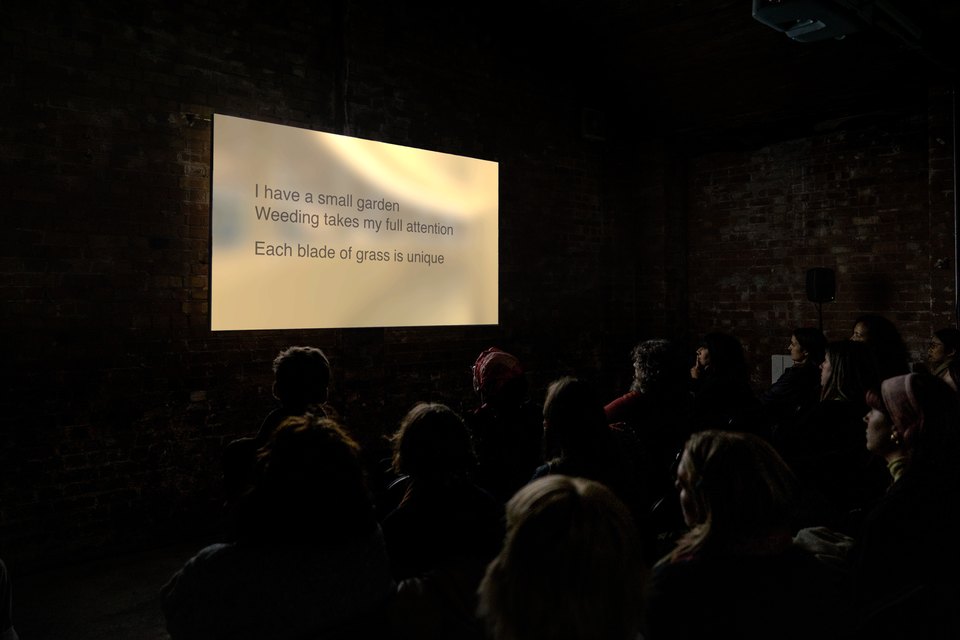The Invisible Women Of Erste Campus | 24-Hour Online Screening
Sanja Iveković
05.01.2024 — 06.01.2024

The Invisible Women Of Erste Campus (2016)
HD Video duration: 26:45
Online on our Homepage
Friday 5 January 2024 noon – Saturday 6 January 2024 midnight (GMT)
Cell Project Space presents Sanja Iveković's The Invisible Women of Erste Campus, a recapture of last year’s event CEED Feminisms 3: Labour, diasporic experience and 'East' to 'West' migration, in which screened moving image and performance works were the texts for a special reading group session moderated by curator and Feminist Duration Reading Group member Dr. Lina Džuverović.
Croatian artist Sanja Iveković's The Invisible Women of Erste Campus is a filmic portrait of the staff who clean Erste Group bank's Vienna headquarters, framed through the repetitive gestures of a day’s work. A roll call introduces the women as they arrive at the Erste Campus in the darkness before dawn; the uniformed women collect colour coded boxes of supplies from a cleaning cupboard, and towards the end of the film, place used cloths into industrial washing machines. The double image of reproductive labour: cleaning the cleaning supplies, anticipates a cycle of tomorrows.
Relentless sounds of cleaning in the soundtrack pause when the women read lines of a poem written for the film by Croatian writer Aida Bagić. In the invisible womens’ mother tongues: Croatian, Ukrainian, Romanian, Turkish, Bagić calls upon Southern and Easterly homes, gardens, the wind, trees, and post, left behind or lost, returning to a syncopated refrain: ‘Fall down, get up, / Fall down again. / Get up,/ Fall down./ Falling comes easy if you practice every day’. Harshly lit HD close-ups of the women reading Bagić’s poetry aloud expose the physical marks of the cleaning work on each woman's face–drawn eyebags and hairs curling with perspiration. Idiosyncrasies of intonation and expression put pressure on the readers' anonymity, where agency remains unrealised.
There are the cleaning women, and here is the architecture; Iveković trains the camera on its hostile, never-ending surfaces. A protagonist in its own right, the building is both character and archetype. In one sequence a large photographic print of a white man, naked and flacid on the wall, towers over the woman hoovering the long corridor. The composition suggests a cloistered ambivalence towards The Erste Group, one of the most important collectors of Central Eastern European artworks, who have commissioned Iveković’s film for presentation within the Erste Campus. In shots framing the women at work through the building’s floor to ceiling windows, they appear as a grid of illuminated repeats. Resemblances to Berwick St Collective’s seminal film Nightcleaners (1975) invoke political and artistic lineages, and solidarities across place/time.
Vienna's geography and imperial histories are animated as the artist unravels the ‘exclusively migrant’ workforce's connections to Central Eastern and Southern Europe, where Erste Group provides financial services. Bagić's poem evokes homesick economic migrants, pointing to flows of labour and capital in Europe moving through the Erste's Vienna HQ, forcefully shaped by its activities. Are these the conditions of the women's invisibility? Ivekovic' film ends with a striking scene: walking down a dimly lit corridor, a woman turns a child's music box, playing L'internationale, a standard of the socialist movement since the nineteenth century and anthem of various anarchist, communist, socialist, and social democratic movements, also notably, the national anthem of the USSR and Soviet Union, 1918-1944. The camera cuts to a meeting room, panning over the cleaners, stony-faced and silent. Contrasting earlier images of lonely workers in the Erste Campus' vast halls and corridors, the gathering prefigures political organising, and a form of visibility that lays claim to rights.
Originally commissioned by Erste Group Bank AG.
Curator Jessie Krish
Croatian artist Sanja Iveković is a photographer, performer, sculptor and installation artist. Known as one of the first artists in Yugoslavia to actively engage with gender difference, tackling the commodification of women’s roles with the onset of consumerism in the country, themes including representation of women and their status in society continue to be central in her work. Iveković has received numerous prizes and awards at film and video festivals, including Locarno and Montreal. She has participated in several biennials including documenta 8, 11, and 13 in Kassel and Manifesta 2 in Luxembourg, as well as in exhibitions at Museum of Contemporary Art, Zagreb; Museum of Modern Art, New York; Taxispalais, Innsbruck; Museu d’Art Contemporani, Barcelona; Van Abbemuseum, Eindhoven; Museum moderner Kunst, Vienna; Fundació Antoni Tapiès, Barcelona, and Museum of Contemporary Art, Los Angeles.
CEED Feminisms is a Research Group of the British Art Network (BAN). BAN is a Subject Specialist Network supported by Tate and the Paul Mellon Centre for Studies in British Art, with additional public funding provided by the National Lottery through Arts Council England. CEED Feminisms is additionally supported by Cockayne Foundation.


